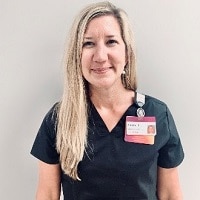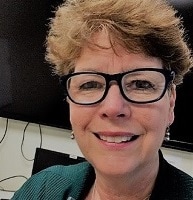Patient Success With DSMES Through Telehealth
DSMES services can’t wait, especially during times of emergency. Referrals from doctors for DSMES allow patients with diabetes to receive the critical care they need from diabetes care and education specialists.
That’s where telehealth can play an important role. Referrals from doctors for DSMES via telehealth allow patients to receive the critical care they need from diabetes care and education specialists. Telehealth options include:
- Video conference.
- Telephone.
- Texting.
These alternatives provide the same life-saving benefits as in-person visits with added convenience for participants. Video conferencing allows diabetes care and education specialists to provide real-time advice. For instance, through video, they can look at the food in a participant’s refrigerator and pantry and give tips related to those specific products.
A group of diabetes care and education specialists in New Jersey stay connected to their DSMES participants through many forms of telehealth, including phone calls and video chats, and they’re sending emails or shipping participants important materials.
Virtual options allow the care to continue without delays. Read success stories below from DSMES participants who are using telehealth during the pandemic.

DSMES services done through telehealth can provide the same life-saving benefits as in-person visits with added convenience for participants.
Visit the Association of Diabetes Care & Education Specialists (ADCES) and the American Diabetes Association (ADA) websites to learn more about diabetes educators and DSMES.
April, DSMES participant
“They are saving my life and giving me a chance to keep my unborn child safe.” — April

April, DSMES participant

Hannah, diabetes care and education specialist
April has type 2 diabetes and recently found out she was pregnant. After her doctor referred her to DSMES, she had a virtual visit with a diabetes care and education specialist, Hannah. Hannah taught April how different foods and physical activity affect her blood sugar. It was during the visit when April confided in Hannah that she wasn’t taking her insulin because she couldn’t afford the prescription.
Hannah worked with April’s pharmacist, connected April to a patient assistance program, and provided coupons to help lower the cost of the insulin to a price that April could afford.
Since meeting with Hannah a few months ago, April’s blood sugar has decreased over 200 points, and it keeps improving. “I’m even more encouraged to keep doing better after seeing these results,” she said. April is grateful for DSMES and her diabetes care team.
William, DSMES participant
“I saw a dramatic difference in my blood sugar levels.” — William

William, DSMES participant

Casey, diabetes care and education specialist
William was diagnosed with type 2 diabetes when he was 18 years old. He used medication to help maintain his blood sugar levels, but it became harder to manage his diabetes as he became an adult. When William went on an insulin pump 3 years ago, he received a referral for DSMES. This was the first diabetes education William ever received.
William’s diabetes care and education specialist, Casey, helped him better understand his diabetes and taught him how to maintain a healthy lifestyle. “I saw a dramatic difference in my blood sugar levels,” William said after he met with Casey.
Everyone at the diabetes care center in South Carolina where William met Casey was instrumental in William’s health improvement. Even during the pandemic, William was able to still receive help with his diabetes care and treatment plan through telehealth services.
DSMES made a dramatic difference in William’s life. “Without the diabetes center, I would be in serious trouble,” he said.
Mary, DSMES participant
“I have a full support team that set me up for success with a healthy lifestyle.” — Mary (not pictured)

Janet, diabetes care and education specialist

Susan, diabetes care and education specialist
Mary was diagnosed with type 1 diabetes after going to the hospital because of diabetic ketoacidosis (DKA) earlier this year. DKA is a serious diabetes complication that can happen when the body produces acids called ketones, which can build up to dangerous levels in the body.
At 24 years old, Mary’s life suddenly changed. With a referral for DSMES from her doctor, Susan and Janet, diabetes care and education specialists in South Carolina, reached out to Mary to teach her how to manage her diabetes.
Susan and Janet taught Mary about insulin, carbohydrate counting, continuous glucose monitors, and insulin pumps and pens. They also taught her about healthier food choices, shared recipes, and taught her how to apply for financial assistance through the proper channels. Currently, Mary stays in touch with her diabetes care and education specialists virtually through telehealth appointments.
Everyone at the diabetes center who Mary worked with were knowledgeable and professional. “They set me up for success through means of a healthy lifestyle,” Mary said. “A very big thank you to all who have helped me on my journey.”
Tess, DSMES participant
“With my husband away, I couldn’t leave my kids at home alone. Telehealth appointments let me meet with my diabetes care and education specialist while my kids slept upstairs.”— Tess (not pictured)

Lori, diabetes care and education specialist
Telehealth allowed Lori, a diabetes care and education specialist in Florida, to meet virtually with Tess, who was diagnosed with gestational diabetes. Tess received important information on how to check her blood sugar and how to count carbohydrates. The telehealth option enabled Lori to talk with Tess at home early in the morning while her children were still asleep.
Lori then emailed materials to Tess and recommended some smartphone apps she could download to help keep track of her carbohydrate intake to help Tess on her journey. “I’m very thankful for Lori and the services she provided,” Tess said.
A Critical Connection During Isolation
Learn more about DSMES as emergency medicine, as provided via telehealth.
During times of emergency, people may not be able to leave their homes for extended periods of time. This social isolation can create anxiety, which may make it more challenging for people with diabetes to manage their health.
The connection that diabetes care and education specialists provide can alleviate some stress, as they provide answers to patients’ critical questions to help them better manage blood glucose, blood pressure, and cholesterol.
Staying connected with telehealth options when in-person visits aren’t possible allows people with diabetes to receive the critical care they need. DSMES can prevent additional short- or long-term complications and reduce the number of visits to the emergency room or hospital. Even after times of emergency, patients may still take advantage of the many benefits of telehealth services.
- Read more about the importance of DSMES during times of emergency.
- Find a diabetes education program near you.
- Learn how a diabetes care and education specialist can help patients.
- See more information at CDC Diabetes on Facebook and @CDCDiabetes on Twitter.